LUCC Events in 2020
Recordings of many past events are available on LUCC's YouTube channel.
To stay informed of all our upcoming events, please sign up to our mailing list at: china.centre@lancaster.ac.uk
_______________________________________________________________________________
9 December 2020
PhD Seminar
Improving EFL Writing During the COVID-19: A Case Study of Data-Driven Learning Application
Speaker: Fangzhou Zhu, Dept of Linguistics and English Language, Lancaster University
Place: Online - for meeting link please contact x.bai6@lancaster.ac.uk
Time: 12-1pm, Wednesday 9 December, 2020
The pandemic of COVID-19 keeps challenging the teaching and learning of English as a foreign language (EFL) in China. Through remote and online instruction, data-driven learning (DDL), which extracts concodances of authentic language examples from specific corpora, can be a powerful tool to help learnings reduce EFL writing errors during the lockdown. It is believed that DDL provides opportunities for inductive and personalised language learning for better writing accuracy. This paper aims to showcase how DDL was mediated with teachers and students for enhancing EFL writing and how these DDL users perceived this learning method during the pandemic. Four students and their English teaching in a Chinese university participated in the study. Students were required to write six assignments electronically, two of which were later revised for four most frequent lexico-grammatical errors under the conditions of typical referencing resources only, DDL material only and the combination of the two. Online error correction spreadsheets and stimulated recalls were used to investigate students' error correction process, while the online questionnaire and interview were designed to retrieve DDL users' perceptions. The study shows DDL material promoted students' cognitive skills for reactivating or supporting their prior knowledge to correct errors, especially article errors. Participants highly appreciated the advantages of online DDL-mediated writing activities during the pandemic, although several problems were also reported for further investigation.
.
24 November 2020
Reearch Seminar Series
Politics of Love: Religion, Secularism, and Love as Political Discourse in Modern China
Speaker: GUO Ting, University of Hong Kong
Place: Online via Teams https://tinyurl.com/LUCC-GUOTing
Time: 2pm-3.30pm, Tuesday, 24 November 2020
This talk examines how the concept of ai (love) as an affective notion has been introduced, adapted and engineered for the building and rebuilding of a modern nation. I will look into the different adaptations and usages of ai by China’s political leaders, in order to reveal the versatile nature of love as a critical mechanism within modern Chinese politics. Rather than studying love in the private realm such as romance, relationship, and family, this project studies love as a public discourse, and political discourse to be more precise, for it is the very word ai that has been more commonly adopted as a political discourse, including aiguo (patriotism), you’ai (friendship) and re’ai (ardent love). Second, I take a longer historical perspective and dedicate a large part of my study to the contemporary era, especially post-Mao China and the Xi Jinping administration for its significance in shaping the post-socialist concept of “love”. Third, rather than looking at manifestations in literature and sources from Christianity only, I explore the impact from revolutionary radicalism and popular religions on the formation and employment of ai in state propaganda and everyday politics. Furthermore, I study some of the most controversial political figures of our time rather than writers and intellectuals, including Sun Yat-sen (1866–1925), Mao Zedong (1893–1976), and Xi Jinping (1953–) as well as female leaders such as Carrie Lam Cheng Yuet-ngor (1957–) and Soong Ching-ling (1893-1981) whose politics of love has thus far been understudied. Taking this approach to love not only furthers the discussion on the role of emotions in the project of Chinese modernity and reconfigures the importance of the notion of love in revolutionary radicalism, but also contributes to the study of postsecular politics around the world today.
.
25 November 2020
PhD Seminar
A 'Mirror-Image' Investigation: Chinese and British Foreign Language Learners' Acculturation Experiences in Short-term SAPs
Speaker: Rui He - University of Glasgow
Place: Online - contact x.bai6@lancaster.ac.uk for link and password
Time: 1-2pm, Wednesday, 25 November 2020
Within the context of internationalisation in worldwide higher education institutions, a one-term or a one-year Study Abroad Programme (SAP) is now embedded in Foreign Studies programmes in many universities all over the world, either as an optional or compulsory part. Although the sojourn in an SAP is transitory, various synergistic aspects, levels and contexts are involved in the complex process of acculturation. This study aims to investigate and compare 'mirror-image' experiences of foreign language degree students: a.) English language learners in China who come to the UK through one-year SAPs, and b.) British learners in Chinese Studies who go to China for one-year SAPs. This talk aims to discuss from the environmental perspective to scrutinise the pivotal factors in both Chinese and British foreign language sojourners' acculturation in short-term SAPs. It also examines the similarities and differences in these environmental factors, as well as how these factors dynamically interplay with each other and impact learners' acculturation experiences.
.
19 October 2020
PhD Seminar
The Soft Use of China's Hard Power
Speaker: Sophie Wushuang Yi, KCL
Place: Online via VooV (腾讯会议): https://voovmeeting.com/s/fMI1nO8JV2eH (Meeting ID: 434 093 502 password:666666)
Time: 12pm-1pm (UK time), 19 October 2020
Since 1978, China has not been involved in any conventional warfare or resolved any conflicts through war-like military operations. Starting from 1990, alongside China's economic miracle, China started to engage in international peacekeeping military operations authorised by the United Nations. As the People's Liberation Army continues to be modernised and professionalised, not using it in conventional warfare creates psychological ambiguity on China's real military intentions within the context of International Relations. The speaker will explore how and why the domestic and international strategic functions of the PLA changes since 1979, and how the evolving formats of conventional warfare vs. non-conventional warfare nurtured this argument of the soft use of China's hard power.
.
13 October 2020
Reearch Seminar Series
Can an Anarchy be a State? China as a Non-State and the Rules of Exit from International Society
Speaker: Yuan Yi Zhu, Oxford University
Place: Online via Teams: https://tinyurl.com/LUCC-YuanYiZhu
Time: 1pm-2.30pm (UK time), 13 October 2020
International Relations has generally assumed that states’ desire for survival is a primary driving factor for state behaviour. Yet the corresponding phenomenon of state extinction has been neglected in IR scholarship, largely as a result of a perception that state extinction is in practice a rare occurrence. Using as case study Japan’s abortive legal challenge to Chinese statehood after its 1931 invasion of Manchuria, this article shows how the doctrine that prolonged internal anarchy could lead to the loss of statehood, once widely accepted within the international community, was effectively rejected during the Inter-War era. Adopting an English School approach and drawing on archival research, I argue that the abandonment of the doctrine was part of a larger shift within the rules governing membership to the international society, notably the decoupling of effectiveness and legitimacy as requirements for statehood. As a result, in modern practice, statehood, once acquired and acknowledged by the international community, is almost impossible to lose, even if the prerequisites of statehood have been lost, a shift which has important consequences for the membership of international society which stretch into the present day.
.
29 June 2020
A Pork Story in China
Speaker: Lingxuan Liu, Lancaster University
Place: Online via Microsoft Teams: Join Microsoft Teams Meeting
Time: 9:30-11:00, 29th June, Monday
Project SIRIUS is a three-year international project looking at the sustainability, resilience and innovation in the urban food system. In this session we provide an update about our recent case study on China’s pork production, which in the past few years, has been influenced by environmental regulations, African Swine Fever, and COVID-19. Those systematic stresses and shocks have made pork a “model food” to understand a sustainable and resilient food system.
.
27-29 June 2020
BPCS Annual Conference
Three LUCC PhD fellows will present their research at the British Postgraduate Association for China Studies (BPCS) annual conference.
27 June: Xue Bai - Hypotheses on policalised consumption (Panel 2 Society and Government)
- Link: https://tinyurl.com/2020bpcs-panel02
- Zoom ID: 841-8932-2118 (Password: 2020bpcs)
- Time: 12:15 - 13:15 (London)
27 June: Yannan Li - The impact of China's state nationalism on ethnic minorities after 1978 (Panel 4 Ethnics and Social Development)
- Link: https://tinyurl.com/2020bpcs-panel04
- Zoom ID: 811-7165-0446 (Password: 2020bpcs)
- Time: 15:00 - 16:00 (London)
28 June: Rui Qian - The representation of Chinese migrant workers in Chinese cinema since 1990s (Panel 5 Film and Literature)
- Link: https://tinyurl.com/2020bpcs-panel05
- Zoom ID: 889-4656-6189 (Password: 2020bpcs)
- Time: 8:30 - 9:30 (London)
.
23 June 2020
When Academic Meets Social Media: Founding an Online Academic Talk Show
Speaker: Jingyi Wang, Cambridge University
Place: Online via Zoom: Meeting ID: 890-4928-0282 (Password: jingyi)
Time: 13:00 - 14:00 (London), Tuesday, 23rd June
Abstract: This decade has witnessed the surge of social media's discursive power in both the online and offline world. Internet celebrities or some random videos could now accumulate followers and clicks that sometimes far exceed what a new academic finding could attract. As a PhD candidate in cultural studies, this phenomenon has not only been my research focus, but also a new opportunity for scholars to communicate with audiences that transcend geographical and temporal limits. Bearing this idea in mind, I funded "Academic Bird", a scholarly talk show that lasts around 20-30 minutes, with another PhD friend on the Chinese Internet since last October. This talk intends not to share my academic research interest, but instead my experience and reflection on how contemporary scholars could better participate and influence the social media space.
.
29 May 2020
BRI: How Can Africa Foster Its Strategic Priorities
Speaker: Justus Nam, PhD candidate, Lancaster University
Place: Zoom Meeting ID: 882-7969-6195 (Password: lucc-phd)
Time: 12:00 - 13:00 (London), Friday, 29th May
The study of international politics has always been inclined towards a robust focus on great powers. Much significance has always been on countries that are able to deploy notable weight of influence on the global system through their discrete actions and decisions. In today's international environment, China is playing an enhanced role and is expanding its influence and presence in difference parts of the world. African countries are seeking new partners to diversity their international relations. The presentation will argue that the agency eventually lies with African stakeholders at both State and non-State levels, to collaborate and cooperate with China in ways that will augment African priorities.
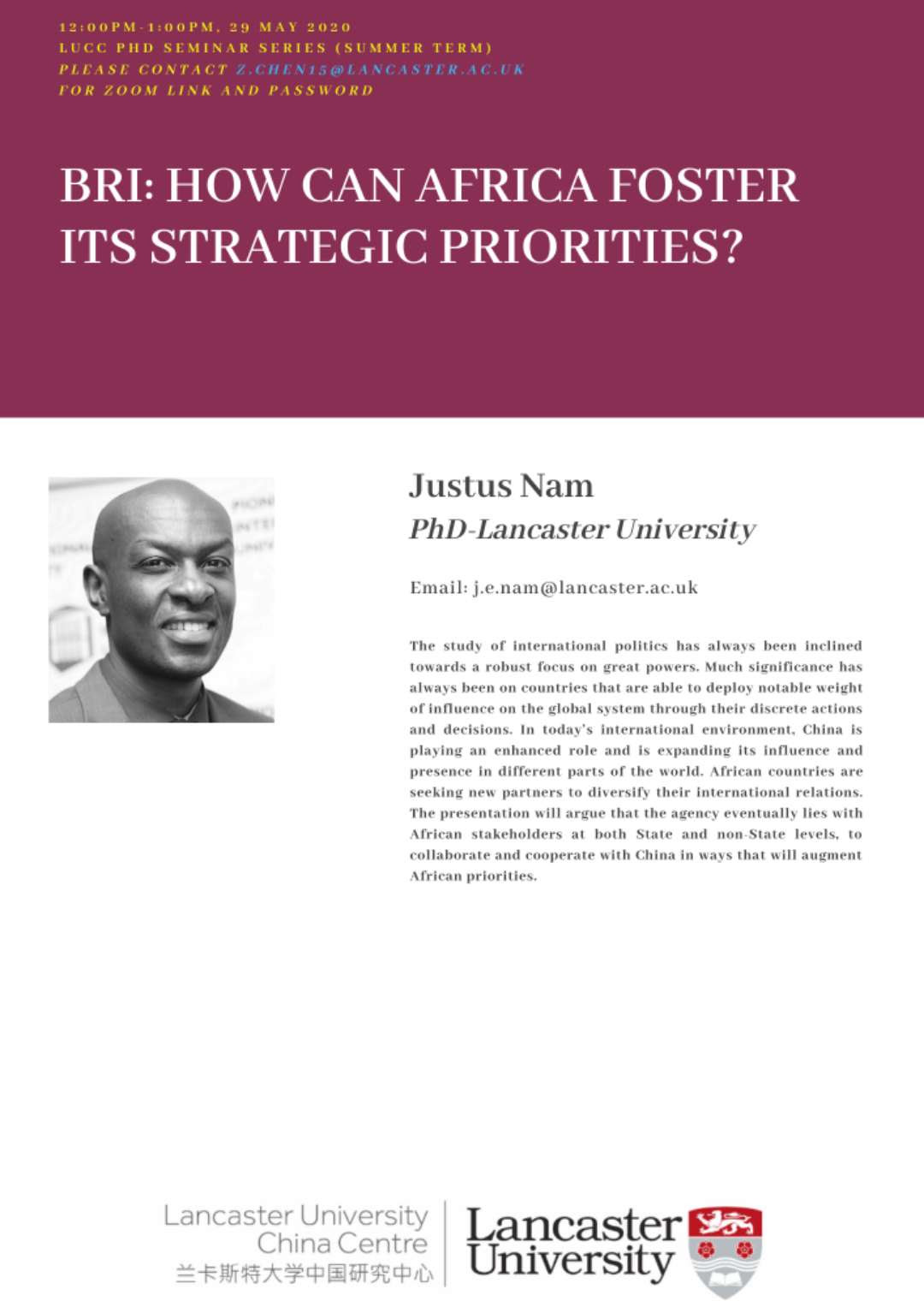
.
Friday, 8th May
Crowding out the Crowd: the Transformation of Network Disaster Communication Patterns on Weibo in Chinese Natural Disasters
Speaker: Lixiong Chen, PhD candidate - Lancaster University
- Venue: Online Zoom meeting - meeting ID: 895 9661 3085; password:BPCSLUCC04
- Time: 12:00 - 13:00, May 8
- Speaker: Lixiong Chen - Lancaster University, PhD candidate
There is a surge in the number of people turning to social media in disasters in China. By constructing relationship matrices of Weibo posters in six Chinese earthquakes of magnitude 6.0 or above, the research reveals a transformation of network crisis communication patterns on Weibo in earthquakes over the past decade. We discuss transformations ofthe communication relationships between different participating Weibo groups: Government agencies, ordinary users, verified individual users and verified organisational users. We observe that government agencies are croding out other users to the periphery of the communication network. Using the relational mobilities paradigm, we consider the ethical complexities of this phenomenon of 'crowding out the crowd'.

.
Thursday, 30th April
Politicizing Masculinities: The Case of Male Grooming in Chinese History and Beyond 政治化男性特质:以中国历史上的男性美容为例说开来
Speaker: Xiaoxi Ding, PhD candidate - Lancaster University
- Venue: Online
- Time: 12:00 - 13:00, Thursday, 30th April
- Speaker: Xiaoxi Ding - Lancaster University, PhD
There is a persistent emphasis in the literature (and perhaps rightfully so) on studying women's body and its relevant consumption/beauty practices as a means of moulding identity and pursuing female emancipation in personal and political terms. Such an emphasis, however risks a return to the Cartesian male/female, mind/body dualism, reinforcing the assumption that men's body is liberated from sociocultural or political constraints and freed from the negotiations of power in gender relations. In this study we examine the developmnet of the interplay between male grooming and portrayals of masculinity in popular media in Chinese history since the year 1949 and in modern times. We show how the construction of hegemonic masculinity operates over time as the male body becomes a site of political 'subjection', inscribed by systems of state control.
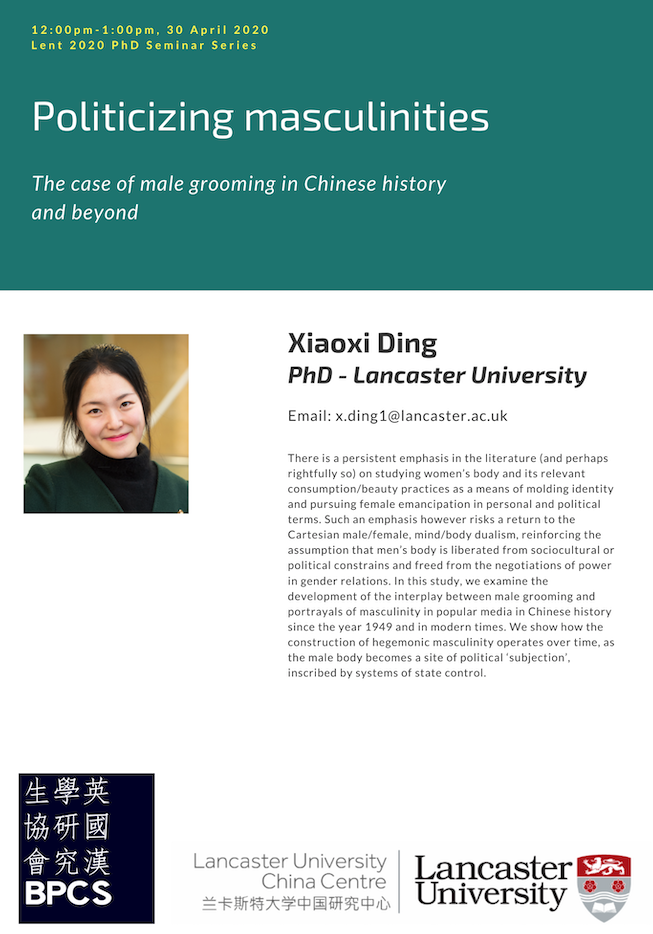
.
Wednesday 25th March, 2020, 1-2pm
Online Panel Discussion: Hong Kong's Protests and the Future of Autonomy
Speakers:
- James Summers (Centre for International Law and Human Rights)
- Eva Li (Sociology)
- Andrew Chubb (Politics, Philosophy and Religion)
- Jinghan Zeng (Confucius Institute / PPR)
- Simon Mabon (Richardson Institute / PPR)
Join us at: https://tinyurl.com/LUHongKong
How can we understand the protests that erupted in Hong Kong in mid-2019? What is the nature of the movement, its impact, and future trajectory? What kind of implications do the Hong Kong protests hold for longstanding questions of sovereignty, self-determination, and identity? How does the movement compare with other social movements globally? And how is it playing out beyond China, in places like the UK? Join the Lancaster University China Centre and the Centre for International Law and Human Rights for an online interdisciplinary analysis of one of one of the key political developments of 2019.
.jpg)
Friday, March 6, 2020, 11am-12pm
PhD seminar: Through the lens of Internet policy: How does the Chinese government build the relations with citizens on social media
Speaker: Zhuo Chen (Lancaster University)
Place: Quiet Room, Chaplaincy
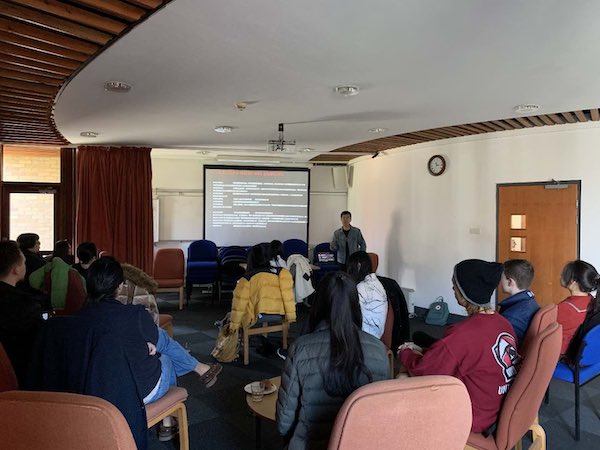
-
Thursday, 27 February, 2020, 12-1pm
PhD seminar: Spatializing hashtag centred political contestation
Speaker: Carwyn James Morris (LSE)
Place: InfoLab C60a, LUNCHTIME BRIEFING WITH FOOD PROVIDED -- please RSVP: https://luccbpcs01.eventbrite.co.uk/
This talk explores the spatialities of digital environments, their borders, by focusing on Weibo, Weibo hashtags and Weixin groups. Based on fourteen months of fieldwork in Beijing and more than two years of digital ethnography and play, this talk examines digitally centred political contestation in China. It focuses on one hashtag project and how it succeeds and fails within censorial and authoritarian territory, that being Chinese physical and digital territory. The project under discussion is, Beijing Surgery, which began in late November 2017 after a deadly fire in Xinjian Village, Beijing, killed 19 people, 17 being translocal migrants. Following the fire a wave of demolition and evictions took place across Beijing, but these events were scrubbed from the official record through media censorship and attempted censorship of digital spaces. Within that censorial environment pockets of resistance emerged, and Beijing Surgery attempted to produce a map tracking the evictions. The study explores the project, its hashtag, the long-image it made use of, the spatial realities of its censorship and how Beijing Surgery managed to survive, through mobility to Weixin. In doing this the study pays close attention to the spatialities and temporalities of censorship, hashtags and digitally centred activism. It argues that there is a necessity for further emphasis on activism in non-U.S. digital spaces in order to understand the multiplicity of digital space and its governance.
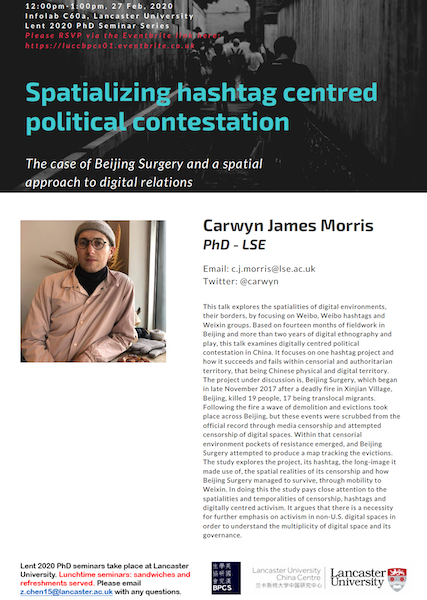
-
Wednesday, 19 February, 2020, 4-6pm
The world of tomorrow: Imagining Afro-Asian Solidarity & the Modernisation Project in the People’s Republic of China in the 1950s
Speaker: Zhiguang Yin, Exeter University
Place: Bowland North Seminar Room 23 - RSVP: bit.ly/33ESzEf
This talk explores the manufacture, distribution and public collective receptions of the internationalist image of Afro-Asian solidarity in the People’s Republic of China (PRC) during the Great Leap Forward period in the late 1950s. It examines the ‘Afro-Asian solidarity’ imagery generated particularly through the Sino-Middle Eastern cultural exchanges, which were made possible through the Afro-Asian cooperation initiatives.
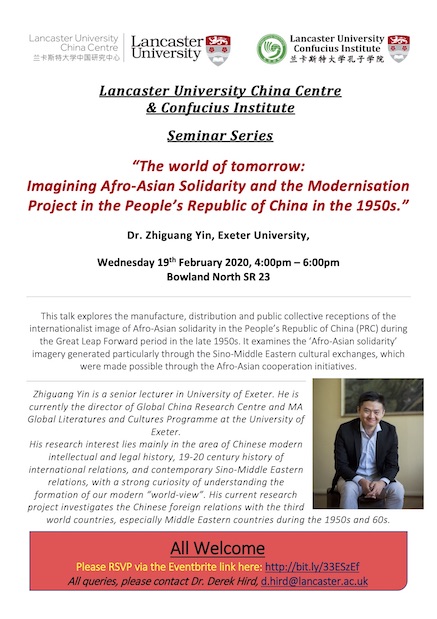
-
Wednesday, 22 January 2020, 3-5pm
Happily Ever After
Film screening and discussion with Dr. He Xiaopei, Pink Space
Place: George Fox Lecture Theatre 2 (LT 2)
Six years after they married gay men, documented by He Xiaopei in Our Marriages - When Lesbians Marry Gay Men, we revisit the same four lesbian women in Shenyang, Northeastern China. We learn how they have created their families with their same-sex partners, gay husbands, children, their own parents as well as parents-in-law. These innovative and intentional family formations invite the viewer to reflect upon mainstream ideas of what makes a family.
-
Tuesday, 14 January 2020, 3-5pm
Regimes of Temporality: China, Tibet and the Politics of Time in the Post-2008 Era
Speaker: Séagh Kehoe, University of Westminster
Place: Charles Carter Building, Room A18
Following the demonstrations that erupted across the Tibetan Plateau in 2008, Chinese state media published dozens of news stories that sought to discredit protesters and reaffirm Chinese rule over Tibet. The relationship between Tibet’s past, present and future was a central focus across much of these stories and has since become an increasingly prominent part of state media reportage about Tibet. While the politics of time are an important dimension of official discourse about Tibet, it remains insufficiently explored in theoretical and practical terms. Seeking to address this, this paper examines the written and visual discourses that characterize Tibetan temporality across Chinese state media in the post 2008 era.
-

